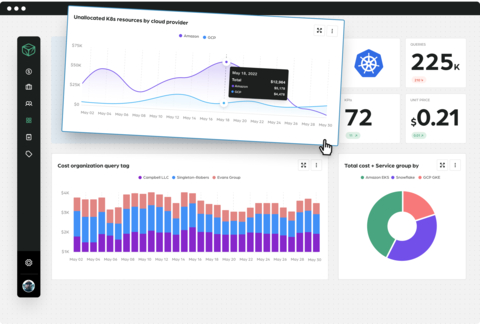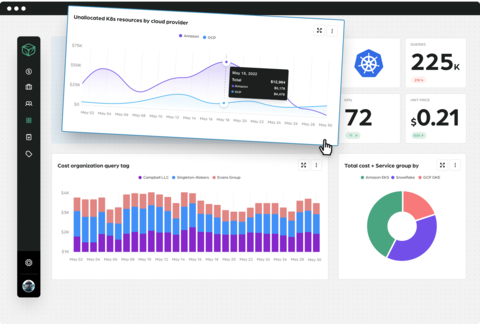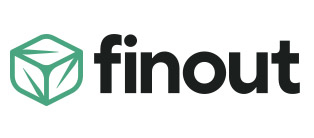TEL AVIV, Israel--(BUSINESS WIRE)--Finout, the cloud cost observability platform, today announced a suite of cost governance tools for managing, forecasting, and optimizing multi-cloud Kubernetes spend. The announcement is being made ahead of KubeCon EU taking place April 18-21 in Amsterdam. FinOps teams now have a central place to understand and reduce their spend on Kubernetes across all clouds, and also forecast into the future to ensure budgets are kept in check. Finout’s agentless solution offers monitoring for unlimited Kubernetes clusters at no additional charge.
“Cloud usage will continue to grow for most scaling modern businesses running on Kubernetes,” said Roi Rav-Hon, CEO & Co-Founder of Finout. “But the days are gone when engineers have virtually unlimited spend. Everyone needs to understand why the money is being spent the way it is, eliminate the waste wherever possible, and ensure on a daily basis that budget is being met and costs are staying within certain limits.”
According to the most recent survey published by the Cloud Native Computing Foundation (CNCF), organizations used Kubernetes for a broader range of use cases last year than ever before, e.g. CI/CD pipelines and scheduled utility workloads. Companies like Dynatrace and Komodor are championing Kubernetes as the de facto operating system of the cloud. Datadog, in their 2022 Container Report 9 Insights on Real-World Container Usage, found that nearly half of all organizations using containers run Kubernetes to deploy and manage at least some of those containers. In addition, alongside the growing adoption of containers, organizations were more likely to adopt a multi-cloud approach as they grow in size.
As the scale and complexity of Kubernetes environments grow, costs can quickly spiral out of control if an effective FinOps strategy is not put in place. According to the most recent State of FinOps report, reporting on the costs of containers is a rising concern for FinOps practitioners. Finout’s solution for managing container costs is completely agentless, reducing security risks and performance overhead by automatically identifying Kuberentes waste across any Kubernetes resource.
Finout’s cost governance suite can be used across Amazon Elastic Kubernetes Service (EKS), Azure Kubernetes Service (AKS), Google Kubernetes Engine (GKE), and more. “It’s impressive how Finout provides everything that we need right out of the box,” said Jean-Brice Gachot, Senior Lead SRE at ManoMano.
Agentless Cost Governance Suite for Kubernetes includes:
- Unlimited Clusters: Analyze unlimited Kubernetes clusters with no additional charge.
- Unified MegaBill: Unlike any other solution in the market. Finout will contextualize Kubernetes spend alongside all other cloud providers and services in a unified dashboard.
- Budget and Forecasting: Set a budget for your Kubernetes deployment and then accurately track spend against that budget. Quickly identify any areas where there may be overspending and make adjustments accordingly. Forecasting leverages machine learning to predict future spend based on past patterns and anticipated changes in workload.
- Anomaly Detection: Identify spend anomalies across Kubernetes and all other major cloud services. Virtual tagging enables anomaly detection for specific teams or applications for greater profitability and accountability.
- Kubernetes CostGuard: Kubernetes cost optimization insights and dynamic recommendations that help organizations continuously manage and reduce their Kubernetes spend.
About Finout
Finout emerged out of stealth in June 2022 with $18.5 Million in funding from Team8 Capital, Pitango First, R Squared Ventures, Jibe Ventures, Ariel Maislos and industry-leading angel investors. The platform is already being used in production within companies such as WIZ, Orca Security, Riskified, AlphaSense and many more. Finout combines all invoices across various cloud providers and services such as AWS, Datadog, Kubernetes, Snowflake and GCP into one centralized bill, enabling an unparalleled view of cloud spend in seconds, then helping FinOps, DevOps and Finance time reduce time on data gathering and analytics, reduce spend and increase profitability across all services and business units such as cost per feature or customer.




